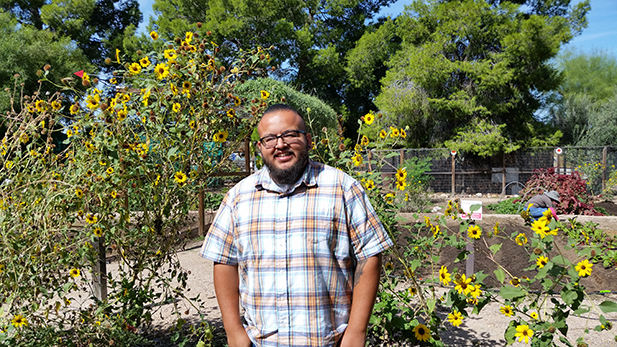 Claudio Rodriguez was in a gang when he discovered the Tierra y Libertad collective in South Tucson. Members taught him how to grow food in the desert, and how to organize for community action. Today, he works for the Community Food Bank of Southern Arizona as a school garden coordinator.
Claudio Rodriguez was in a gang when he discovered the Tierra y Libertad collective in South Tucson. Members taught him how to grow food in the desert, and how to organize for community action. Today, he works for the Community Food Bank of Southern Arizona as a school garden coordinator.Production of Feeding Our Future is made possible with the support of the Zuckerman Family Foundation.
“Some people wake up saying, ‘What do I want to eat today?’ And then some people wake up and it’s like, ‘What can I eat today?’”
That’s Claudio Rodriguez. He just finished teaching a group of elementary school kids about composting. He works for the Community Food Bank of Southern Arizona as a school garden coordinator. The class is over and the kids are running around playing with balloons. There are loud popping noises.
“They’re popping balloons,” he explains. “We are in South Tucson, but we’re pretty safe.”
He’s only half-joking about the balloons sounding like gunshots. In his life, he’s seen a lot of violence.
“Some people wake up saying, ‘What do I want to eat today?’ And then some people wake up and it’s like, ‘What can I eat today?’” – Claudio Rodriguez, Member, Tierra y Libertad Collective
“In middle school I started learning about gangs and drugs, and in high school I was initiated into a gang,” he says. Rodriguez is from Barrio Los Ninos. It’s south of Davis Monthan Air Force Base. “I learned how to sell drugs. I learned how to use guns.”
His best friend was stabbed 23 times by a rival gang member. He died in Rodriguez’s arms. He was 18 years old.
“His name was Tomas Luna. He’d say: ‘You’re really smart, Claudio, you should go to school.’”
So Rodriguez enrolled at Pima Community College. He connected with the Chicano student group MECha.
“Some home girl invited me, “Come to this garden, we’re going to plant.’ I said okay,” he remembers. That’s how he discovered Tierra y Libertad. It’s a grassroots community organization in South Tucson.
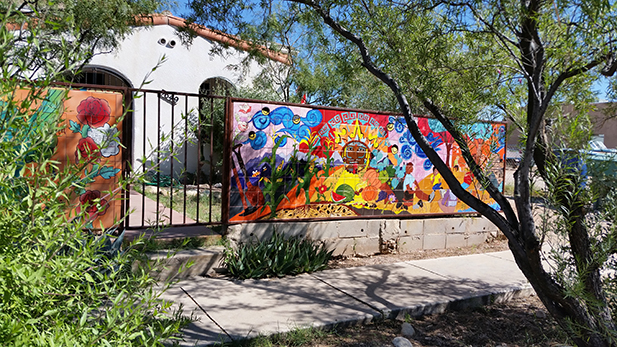 Colorful mosaics invite neighbors to see what Tierra y Libertad, on South 7th Street in the Wakefield neighborhood of South Tucson, is doing. The collective works to transform the barrio and teaches neighbors ways to live sustainably.
Colorful mosaics invite neighbors to see what Tierra y Libertad, on South 7th Street in the Wakefield neighborhood of South Tucson, is doing. The collective works to transform the barrio and teaches neighbors ways to live sustainably. “Tierra y Libertad means land and freedom. It’s actually an old war cry from the 1910 revolution.” He means the Mexican revolution.
So he goes to check out this group. It’s in a house on South 7th, in the Wakefield neighborhood. “I was expecting to see fruit trees, chickens, ducks, tomatoes. But when I got there it was nothing but a dirt lot. I asked one of the lead organizers, ‘So where’s this garden at? Are we going to walk to it, or what?’ He said, ‘We’re going to build it.’ And I said, ‘Whaat?’ I thought he was crazy. So every Saturday I started coming back. They had little workshops on composting, little workshops on site design.”
“Popular education moves us to … change our communities into better places.” – Cesar Lopez, Community Activist and Farmer
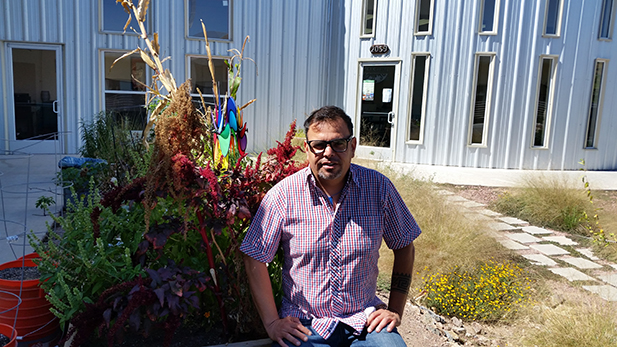 Cesar Lopez is a community activist and farmer in Southern Arizona, based in Nogales. He was an early member of Tierra y Libertad.
Cesar Lopez is a community activist and farmer in Southern Arizona, based in Nogales. He was an early member of Tierra y Libertad. “That farming and that water harvesting course and all that, what it really is, is a leadership course through popular education,” says Cesar Lopez. He was an early member of Tierra y Libertad. “Popular education means exactly that: el pueblo -- the people. Training people how to grow food in the desert, harvesting water.”
He learned about popular education from clinics in South Tucson and from his work with the Zapatistas in Mexico
“In this present day we have a lot of community members that suffer,” he says. “Maybe it’s because they don’t have the right paperwork to be in this country, or the right paperwork to work a dignified job. Maybe there actually is no opportunities. Popular education moves us to confront that; to change it within ourselves; change it systemically; to change our communities into better places.”
Rodriguez says Tierra y Libertad has always been about more than food. It’s about teaching people how to create positive changes in their barrios.
Rodriguez says, “One day Cesar comes up to me and says do you want a job in the summer. I said ‘Hell yeah I want a job in the summer. What else am I going to do, you know?’ ”
They called it “Freedom Summer.” Lopez taught a group of young people the basics of public health. “We learned about how to community organize,” says Rodriguez, “how to eat healthy, sex ed, drug abuse, harm reduction.”
Then Rodriguez and the other youth went into the community and taught it to others.
“It saved my life,” he says. He left the gang. He continued to learn about growing food and community organizing from Tierra y Libertad. “Eventually, it landed me a job,” he says – with the Community Food Bank.
“I get to work with kids who are in the situation I was or I know are going to end up in a situation that I was, so at least I can influence them a little bit. ‘Grow your own food. Sell your tomatoes so you don’t have to sell anything else.”
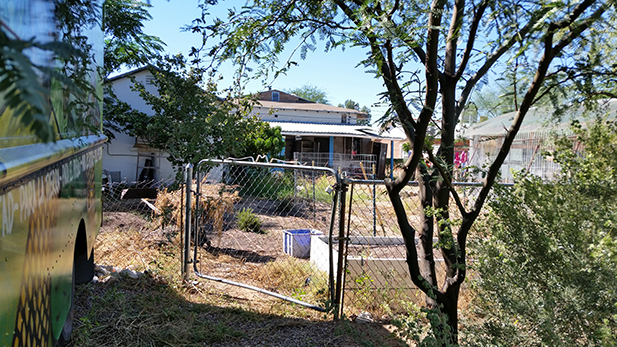 Tierra y Libertad turned a dirt lot into a flourishing garden with a green house and aquaponics system.
Tierra y Libertad turned a dirt lot into a flourishing garden with a green house and aquaponics system. Rodriguez is now the lead organizer for the collective. Nine years later, that dirt lot in South Tucson is a flourishing garden. More houses in the neighborhood have gardens and rainwater harvesting. But he says Tierra y Libertad has always been about more than food. It’s about teaching people how to create positive changes in their barrios.
Tierra y Libertad runs a migrant protection network and legal fund. Rodriguez is excited about a plan to distribute fresh, organic produce to seniors in the neighborhood.
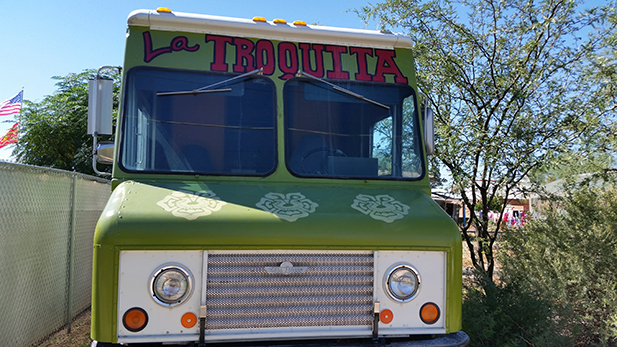 La Troquita is one of the latest projects of Tierra y Libertad. Claudio Rodriguez says the plan is to drive around the neighborhood and sell affordable, organic produce, “like an ice cream truck, only with vegetables.”
La Troquita is one of the latest projects of Tierra y Libertad. Claudio Rodriguez says the plan is to drive around the neighborhood and sell affordable, organic produce, “like an ice cream truck, only with vegetables.”“We have a food truck, called La Troqita,” he says. “And the hopes of that is to grow enough food so that we can drive around -- just the same way the ice cream man drives around distributing ice cream and sugar and all that – we want to do the same, but for vegetables.”
South of 22nd Street and east of Aviation highway, another collective is also working to transform a neighborhood. Barrio Centro is home to Jesus Romero – he goes by “Tito.”
“Tierra y Libertad, they were really, really inspiring for me as a young man,” he says.
Romero co-founded a collective in Barrio Centro. It’s called Flowers and Bullets.
“Flower and Bullets, that duality we live here,” he says. “Some people might say it looks rundown, ghetto. But this is home. I want to be able to grow beauty here.”
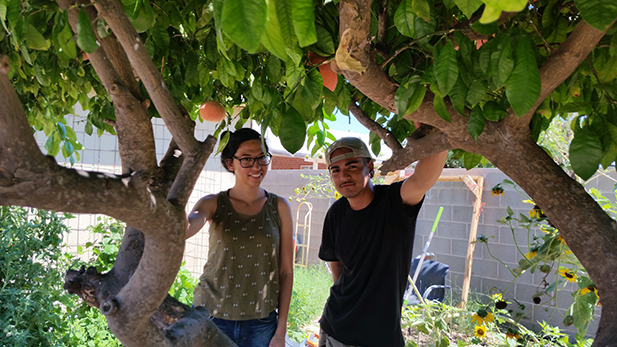 Dora Martinez (left) and Jesus “Tito” Romero in Romero’s backyard garden in Barrio Centro. Along with a rich variety of vegetables and flowers, they grow fruit trees and raise goats.
Dora Martinez (left) and Jesus “Tito” Romero in Romero’s backyard garden in Barrio Centro. Along with a rich variety of vegetables and flowers, they grow fruit trees and raise goats. He’s in the parking lot of the Julia Keen School with another Flowers and Bullets member – Dora Martinez. You can hear noisy cicadas in the trees. And jets from nearby Davis-Monthan Air Force Base.
“Tierra y Libertad, they were really, really inspiring for me as a young man.” – Tito Romero, Co-Founder, Flowers and Bullets Collective
“This is going to happen a lot,” says Dora over the noise. The jet is so low it looks like it’s going to land on the roof.
“That’s why this school is closed down,” Romero explains. The Tucson Unified School District closed Julia Keen in 2003, because of the noise. It’s on the flight path.
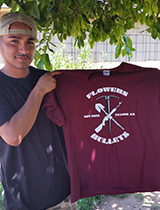 Tito Romero holds up one of the Flowers and Bullets t-shirts. Collective member silkscreen graffiti art on the shirts and sell them. The profits go into the gardens.
Tito Romero holds up one of the Flowers and Bullets t-shirts. Collective member silkscreen graffiti art on the shirts and sell them. The profits go into the gardens.“This was the neighborhood school,” says Martinez. “It was also where folks would come and do their voting. Health fairs or health clinics were also held here. It was really a community center and kind of the hub” of Barrio Centro. Romero says kids used to play here, but the basketball courts were taken out.
“There’s no real green spaces south of 22nd Street,” he says. “You have more dialysis centers, smoke shops, payday loans, pawnshops. I grew up as one of those little knucklehead kid up and down this street. I just love this place. But at the same time, I see what’s going on. I see what my friends are involved in.”
Domestic violence, unemployment and drugs.
“What’s in right now is heroin,” says Romero. “A lot of my good friends are in prison because of it.”
Flowers and Bullets put in a proposal to TUSD to turn the boarded-up Julia Keen school back into the beating heart of Barrio Centro.
He credits the Mexican-American Studies Program at Tucson High for putting him on a different path. “We started asking why the world was the way it was – colonization, oppression, health issues. It showed us a way to channel a lot of that fear, a lot of that anger, a lot of that sadness.”
TUSD cut the controversial program in 2012. That same year, Romero and his friend Jacob Robles started Flowers and Bullets. At first, they silkscreened graffiti art on t-shirts and sold them. With their first profits they bought seeds and planted a garden in Romero’s mother’s back yard. At the time, Dora Martinez was working as a field manager for Sleeping Frog Farms, near Benson. She shared her knowledge and expertise about growing food in the desert and harvesting rainwater.
“I was working in Tito’s garden, and helping him plant some stuff,” she remembers, and neighbors stopped by. They were curious. “There’s a lot of food insecurity in this neighborhood. They were like, ‘Could I have a garden? How hard is it? What would it look like? My yard is smaller. Hey, I live with my parents; they don’t have a lot of space.’ ”
Romero says, “Food – everyone eats. It’s a hook” to get people involved and connected in the barrio. Flowers and Bullets members worked together to install 10 backyard gardens, set up rainwater harvesting systems and build chicken coops and goat pens.
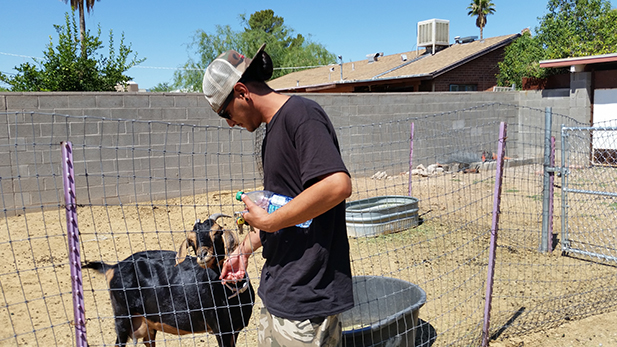 Tito Romero makes and sells soap from goats milk. He has a part-time job in Douglas as a ranch hand, and he brings back the skills and knowledge he learns and shares it with other Flowers and Bullets members.
Tito Romero makes and sells soap from goats milk. He has a part-time job in Douglas as a ranch hand, and he brings back the skills and knowledge he learns and shares it with other Flowers and Bullets members.Today, there are 23 collective members, and they share their knowledge and expertise with one another. They also share their surplus produce, eggs, goat milk and meat. Martinez taught a free workshop to neighbors on how to harvest goat meat and use the various parts of the animal.
“I’m showing folks how to grow, sell and eat their own food,” says Tito Romero, “how to raise their own animals; how to take care of ourselves. Nobody else is going to do it. I’m empowering my community.”
These gardens and animals provide low-income families in Barrio Centro with healthy, organic food, and members make extra money selling their surplus and goats milk soap and other home-made products at farmers markets. Dora Martinez says it has raised people’s self-confidence.
“ We’re trying to present a space where folks can talk to each other and come up with their own solutions.” – Dora Martinez, Flowers and Bullets Collective Member
“One of the guys we work with, he said, ‘Hey this is exactly what I know what to do. I know how to count, I know how to weigh, I just have to change up the product.’ ”
He’s a former drug dealer.
Martinez says some collective members went back and got their GEDs, and others are taking college classes. But she also cautions that no one should romanticize the work they’re doing. That former drug dealer – he’s using again.
“We don’t have a solution” she says, “and in fact we’re not trying to present a solution. We’re trying to present a space where folks can talk to each other and come up with their own solutions.”
Flowers and Bullets members went door to door to survey their neighbors about what they wanted to see happen in Barrio Centro.
“More green spaces,” says Martinez. “A place to walk their dogs. A place to walk with their strollers and feel safe. A place to convene and have a sense of ownership.”
So Flowers and Bullets put in a proposal to TUSD to turn the boarded-up Julia Keen school back into the beating heart of Barrio Centro.
“We envision demonstration gardens, healing spaces, art spaces,” she says.
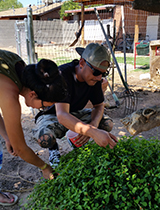 Dora Martinez and Tito Romero pick chiltepines in his garden.
Dora Martinez and Tito Romero pick chiltepines in his garden.“In a perfect world,” says Romero, “when people from out of town drive into Tucson, they want to see murals, and they want to see a community of color that’s almost autonomous, creating their own way, I want them to think of Centro, I want them to think of Julia Keen. I want to be able to create more jobs and opportunities for my friends.”
Flowers and Bullets members went door to door to survey their neighbors about what they wanted to see happen in Barrio Centro.
He’s also concerned about creeping gentrification. Barrio Centro rents have gone up dramatically in the last few years. Landlords are advertising to snowbirds and University of Arizona students, because the neighborhood is only a few minutes from downtown and campus.
Tito Romero ran for a seat on the Barrio Centro Neighborhood Association board. At 28, he’s the youngest member, and one of the few people of color. He just became co-chair.
“I’m a warrior for my community,” he says.
Romero quotes a favorite saying: “If you’re not at the table, you’re on the menu.”
Tune in to Arizona Spotlight or log on to AZPM.org next week for the final episode of Feeding Our Future: Farmers and Markets on NPR 89.1.

By submitting your comments, you hereby give AZPM the right to post your comments and potentially use them in any other form of media operated by this institution.